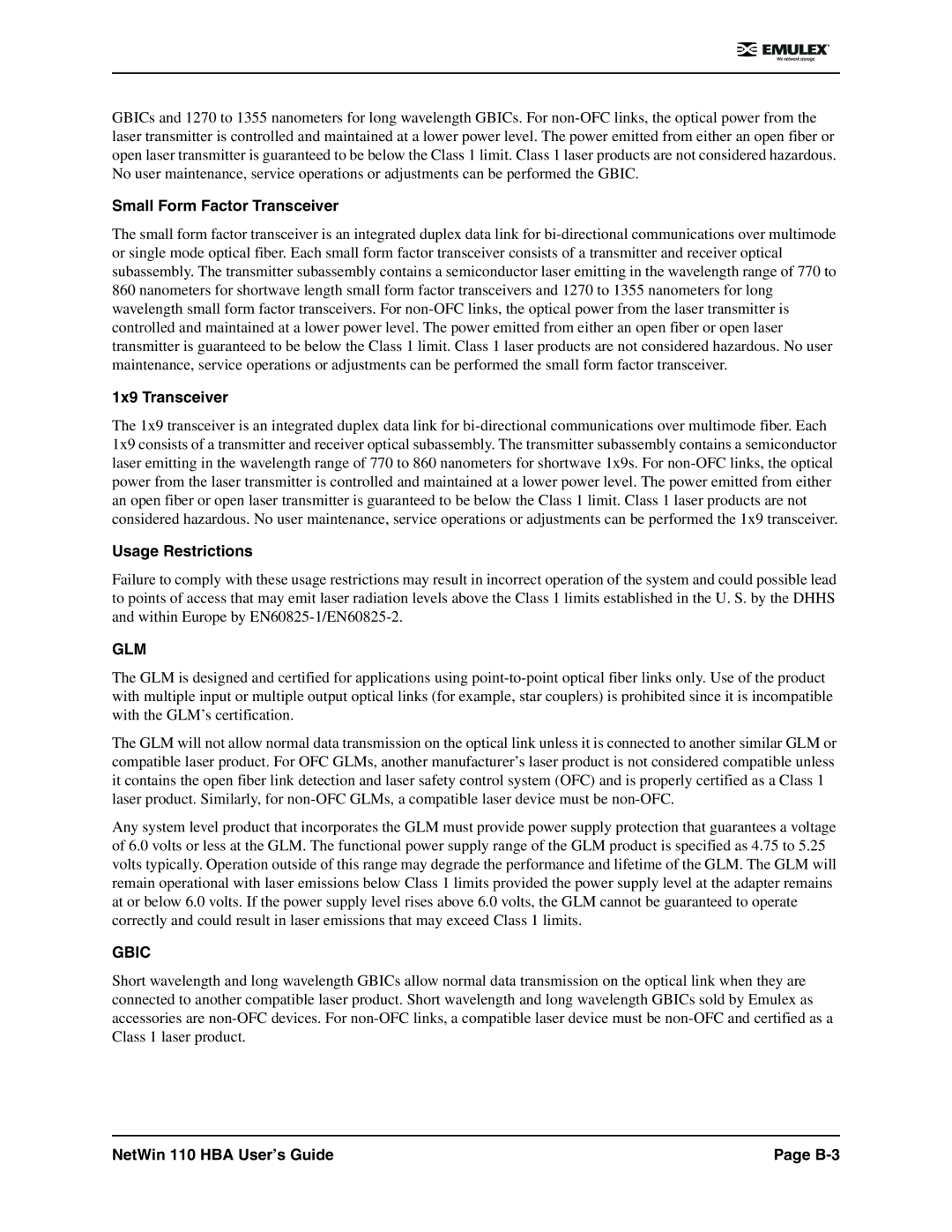GBICs and 1270 to 1355 nanometers for long wavelength GBICs. For non-OFC links, the optical power from the laser transmitter is controlled and maintained at a lower power level. The power emitted from either an open fiber or open laser transmitter is guaranteed to be below the Class 1 limit. Class 1 laser products are not considered hazardous. No user maintenance, service operations or adjustments can be performed the GBIC.
Small Form Factor Transceiver
The small form factor transceiver is an integrated duplex data link for bi-directional communications over multimode or single mode optical fiber. Each small form factor transceiver consists of a transmitter and receiver optical subassembly. The transmitter subassembly contains a semiconductor laser emitting in the wavelength range of 770 to 860 nanometers for shortwave length small form factor transceivers and 1270 to 1355 nanometers for long wavelength small form factor transceivers. For non-OFC links, the optical power from the laser transmitter is controlled and maintained at a lower power level. The power emitted from either an open fiber or open laser transmitter is guaranteed to be below the Class 1 limit. Class 1 laser products are not considered hazardous. No user maintenance, service operations or adjustments can be performed the small form factor transceiver.
1x9 Transceiver
The 1x9 transceiver is an integrated duplex data link for bi-directional communications over multimode fiber. Each 1x9 consists of a transmitter and receiver optical subassembly. The transmitter subassembly contains a semiconductor laser emitting in the wavelength range of 770 to 860 nanometers for shortwave 1x9s. For non-OFC links, the optical power from the laser transmitter is controlled and maintained at a lower power level. The power emitted from either an open fiber or open laser transmitter is guaranteed to be below the Class 1 limit. Class 1 laser products are not considered hazardous. No user maintenance, service operations or adjustments can be performed the 1x9 transceiver.
Usage Restrictions
Failure to comply with these usage restrictions may result in incorrect operation of the system and could possible lead to points of access that may emit laser radiation levels above the Class 1 limits established in the U. S. by the DHHS and within Europe by EN60825-1/EN60825-2.
GLM
The GLM is designed and certified for applications using point-to-point optical fiber links only. Use of the product with multiple input or multiple output optical links (for example, star couplers) is prohibited since it is incompatible with the GLM’s certification.
The GLM will not allow normal data transmission on the optical link unless it is connected to another similar GLM or compatible laser product. For OFC GLMs, another manufacturer’s laser product is not considered compatible unless it contains the open fiber link detection and laser safety control system (OFC) and is properly certified as a Class 1 laser product. Similarly, for non-OFC GLMs, a compatible laser device must be non-OFC.
Any system level product that incorporates the GLM must provide power supply protection that guarantees a voltage of 6.0 volts or less at the GLM. The functional power supply range of the GLM product is specified as 4.75 to 5.25 volts typically. Operation outside of this range may degrade the performance and lifetime of the GLM. The GLM will remain operational with laser emissions below Class 1 limits provided the power supply level at the adapter remains at or below 6.0 volts. If the power supply level rises above 6.0 volts, the GLM cannot be guaranteed to operate correctly and could result in laser emissions that may exceed Class 1 limits.
GBIC
Short wavelength and long wavelength GBICs allow normal data transmission on the optical link when they are connected to another compatible laser product. Short wavelength and long wavelength GBICs sold by Emulex as accessories are non-OFC devices. For non-OFC links, a compatible laser device must be non-OFC and certified as a Class 1 laser product.

